Related Research Articles
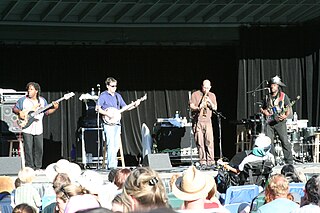
Béla Fleck and the Flecktones is an American band that combines jazz and bluegrass music.

Stanley Clarke is an American bassist, composer and founding member of Return to Forever, one of the first jazz fusion bands. Clarke gave the bass guitar a prominence it lacked in jazz-related music. He is the first jazz-fusion bassist to headline tours, sell out shows worldwide and have recordings reach gold status.

Armando Anthony "Chick" Corea was an American jazz pianist, composer, bandleader and occasional percussionist. His compositions "Spain", "500 Miles High", "La Fiesta", "Armando's Rhumba" and "Windows" are widely considered jazz standards. As a member of Miles Davis's band in the late 1960s, he participated in the birth of jazz fusion. In the 1970s he formed Return to Forever. Along with McCoy Tyner, Herbie Hancock and Keith Jarrett, Corea is considered to have been one of the foremost pianists of the post-John Coltrane era.

Friedrich Gulda was an Austrian pianist and composer who worked in both the classical and jazz fields.

Michel Camilo is a Dominican pianist and composer. He specializes in jazz, Latin and classical piano work.

Jean-Luc Ponty is a French jazz and jazz fusion violinist and composer.
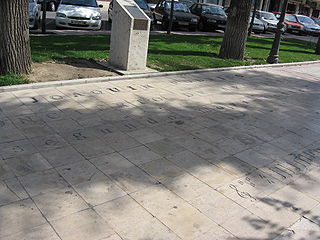
The Concierto de Aranjuez is a concerto for classical guitar by the Spanish composer Joaquín Rodrigo. Written in 1939, it is by far Rodrigo's best-known work, and its success established his reputation as one of the most significant Spanish composers of the 20th century.

Kenny Garrett is an American post-bop jazz musician and composer who gained recognition in his youth as a member of the Duke Ellington Orchestra and for his time with Miles Davis's band. His primary instruments are alto and soprano saxophone and flute. Since 1985, he has pursued a solo career.

Light as a Feather is technically the first studio album by jazz band Return to Forever led by keyboardist Chick Corea. It features saxophonist/flautist Joe Farrell, bassist Stanley Clarke, vocalist Flora Purim and her husband, drummer/percussionist Airto Moreira, who all performed on Corea’s previous album Return to Forever, from which the group took its name.

Chick Corea Elektric Band was a jazz fusion band, led by keyboardist and pianist Chick Corea and founded in 1986 in New York City. The band was nominated twice at the Grammy Awards. The sixth band album, a tribute one named Chick Corea Elektric Band II - Paint the World and released in 1993, received an additional nomination the next year. The group reunited in 2003, and Corea died in 2021.

Biréli Lagrène is a French jazz guitarist who came to prominence in the 1980s for his Django Reinhardt–influenced style. He often performs in swing, jazz fusion, and post-bop styles.

Light Years is an album by the Chick Corea Elektric Band. It features Chick Corea with guitarist Frank Gambale, saxophonist Eric Marienthal, bassist John Patitucci, and drummer Dave Weckl. The album received the 1988 Grammy Award for the Best R&B Instrumental Performance.
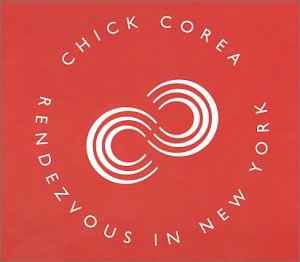
Rendezvous in New York is an album by American pianist Chick Corea that was released on April 22, 2003 by Corea's label, Stretch Records. The recording took place at the Blue Note Jazz Club in New York City over the course of three weeks. Corea reunited with members from nine bands that he played with in the past. Musicians included Terence Blanchard, Gary Burton, Roy Haynes, Bobby McFerrin, Joshua Redman, Gonzalo Rubalcaba, and Miroslav Vitous.

Hadrien Feraud is a French jazz bassist.
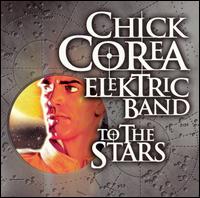
To the Stars is an album by American jazz fusion group the Chick Corea Elektric Band, released on August 24, 2004, by Stretch Records. Jazz musician Chick Corea, a longtime member of the Church of Scientology, was inspired by Scientology founder L. Ron Hubbard's science fiction 1954 novel To the Stars. Hubbard's book tells the story of an interstellar crew which experiences the effects of time dilation due to traveling at near light speed. A few days experienced by the ship's crew could amount to hundreds of years for their friends and family back on Earth.
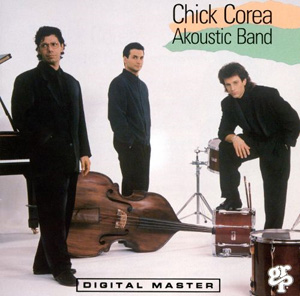
Akoustic Band is the first album by the Chick Corea Akoustic Band, featuring Chick Corea with John Patitucci and Dave Weckl. The group was nominated and received the 1990 Grammy Award for Best Jazz Instrumental Performance, Group at the 32nd Annual Grammy Awards.

In the 1970s in jazz, jazz became increasingly influenced by Latin jazz, combining rhythms from African and Latin American countries, often played on instruments such as conga, timbale, güiro, and claves, with jazz and classical harmonies played on typical jazz instruments. Artists such as Chick Corea, John McLaughlin and Al Di Meola increasingly influenced the genre with jazz fusion, a hybrid form of jazz-rock fusion which was developed by combining jazz improvisation with rock rhythms, electric instruments, and the highly amplified stage sound of rock musicians such as Jimi Hendrix. All Music Guide states that "..until around 1967, the worlds of jazz and rock were nearly completely separate." However, "...as rock became more creative and its musicianship improved, and as some in the jazz world became bored with hard bop and did not want to play strictly avant-garde music, the two different idioms began to trade ideas and occasionally combine forces." On June 16, 1972 the New York Jazz Museum opened in New York City at 125 West 55th Street in a one and one-half story building. It became the most important institution for jazz in the world with a 25,000 item archive, free concerts, exhibits, film programs, etc.
"500 Miles High" is a jazz fusion song by American musician Chick Corea and Return to Forever. Composed by Corea with lyrics by Neville Potter, it was recorded in 1972 for the group's second album, Light as a Feather, which was released in 1973. Brazilian singer Flora Purim provides the vocal and the piece became her signature song and a jazz standard.
References
- ↑ "Chick Corea". Blue Note. Retrieved 25 July 2017.
- ↑ Nastos, Michael G., ""Return to Forever Light as a Feather (1973) album review | AllMusic"", allmusic.com, retrieved 2024-04-28,
Perhaps Corea's definitive song of all time, and covered ad infinitum by professional and school bands, "Spain" retains the quirky melody, handclapped interlude, up-and-down dynamics, exciting jam section, and variation in time, tempo, and colorations that always command interest despite a running time of near ten minutes.
- ↑ Collar, Matt. "Chick Corea Biography". AllMusic. Retrieved 2024-04-28.
[...] penning such beloved jazz standards as "Spain," [...] Light as a Feather. Another Top Ten jazz album, it earned Corea his first two Grammy nominations, including Best Instrumental Arrangement for "Spain," largely considered his best-known song.
- ↑ Swenson, John, ed. (1985). The Rolling Stone jazz record guide. A Random House/Rolling Stone Press Book (1st ed.). New York: Random House. ISBN 978-0-394-72643-4.
Several modern jazz classics reside within, including "You're Everything", "500 Miles High" and "Spain."
- ↑ Hoyt, Alex (2011-11-25). "How Chick Corea Wrote 'Spain'". The Atlantic. Retrieved 2024-04-28.
- ↑ Herzig, Monika (2017). "Return to Forever— The Acoustic Years". Experiencing Chick Corea: a listener's companion. The Listener's Companion. Lanham: Rowman & Littlefield. ISBN 978-1-4422-4469-6.
- ↑ Bălan, Florin (30 December 2022). "Fundamental Analysis of Chick Corea's Improvisation in Spain (1972)". Studia Universitatis Babeş-Bolyai Musica. 67 (2): 99–110. doi: 10.24193/subbmusica.2022.spiss2.07 .